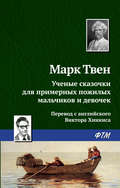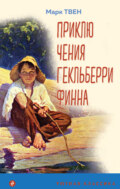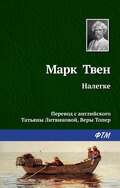
Марк Твен
Приключения Тома Сойера: адаптированный текст + задания. Уровень B1
Tom’s army won a great victory, after a long and hard battle. Then the dead were counted, prisoners exchanged, and the day for the next battle was chosen; the armies walked away, and Tom went home.
On his way back, he passed the house of his schoolmate Jeff Thatcher. In the yard he noticed a beautiful girl who immediately won his heart. Tom forgot his girlfriend, Amy Lawrence right at once.
When he was sure the strange girl was watching, he began to show off, acting like a fool, doing all sorts of silly tricks. Although the girl seemed not to pay attention, she threw a flower to him just before she went into the house.
Tom tried to act indifferent, but then he ran and took the flower between his toes when he was sure that the girl was gone.
He stayed around the house for the rest of the evening, hoping to see the girl again, but she did not return, so he went back home.
Tom was so happy with his new love that he even wasn’t offended when Aunt Polly accused him of stealing sugar. (Actually, Sid had committed this crime). When the old lady shouted at him and hit him he cried:
‘Sid was stealing sugar and brought the sugar-bowl!’
Aunt Polly stopped, embarrassed and only said:
‘I’m sure you have done something wrong, only I don’t know what it was!’
* * *
On Sunday after breakfast Tom went to learn ‘his verses’ from the Bible. Sid had learned his lesson days before. At the end of half an hour Tom had a general idea of his lesson, but no more.
Mary, his elder cousin, promised to give him a present if he learned the lesson well.
That made Tom do his best – and be a success. So Mary gave him a new knife worth twelve and a half cents. Although the knife could not cut anything, Tom was delighted. He was going to try the knife on the furniture when he was called off to dress for Sunday-school.
Mary took care of the process. She made Tom put on a suit that had been used only on Sundays during two years. He now looked much better and felt very uncomfortable. He hoped that Mary would forget his shoes, but she asked Tom to put them on:
‘Please, Tom – be a good boy.’
So he got into the shoes. Mary was soon ready, and the three children went to Sunday-school – a place that Tom hated with his whole heart; but Sid and Mary were fond of it.
At the door Tom asked another pupil:
‘I say, Billy, have you got a yellow ticket?’
‘Yes.’
‘What’ll you take for it?’
‘What’ll you give?’
‘A fish-hook.’ (Tom had become rich after his whitewashing operation).
So he exchanged one of his “treasures” for a yellow ticket. Then Tom traded a couple of other small things for three red tickets, and a couple of blue ones. He went on buying tickets of different colours ten or fifteen minutes longer.
Then the lesson began. Almost all the children in Tom’s class were noisy, and troublesome. When they came to recite their lessons, no one knew his verses well. However, each pupil got his reward – in small blue tickets; each blue ticket was a pay for two learned verses. Ten blue tickets could be exchanged for a red one; and ten red tickets could be exchanged for a yellow one. For ten yellow tickets Mr. Walters (the teacher) gave a very cheap Bible (worth forty cents) to the pupil. So, to get it a pupil had to learn two thousand verses. Mary had collected two Bibles in this way – it cost her two years of work.
Frankly speaking, Tom has never been interested in getting such a prize, but he wanted the glory and success.
In the middle of the lesson Mr. Walters said to the pupils:
‘Now, children, I want you all to sit up as straight and nice as you can. We are going to have important visitors”.
The visitors were: Judge Thatcher, brother of the village lawyer and a well-dressed lady, his wife. The lady was leading a child – the girl whom he had already met once and who became his “new love”. When Tom saw this girl he began showing off with all his might – beating other boys, pulling hair, making faces – in a word, he did everything he could to win the girl’s heart.
The visitors were given the seat of honor. They were from Constantinople, twelve miles away – so they had travelled, and seen the world. Jeff Thatcher, Tom’s classmate was proud of his relatives.
Mr. Walters tried to show how good he was at teaching. There was one thing that could make his success complete. It was a chance to call an excellent pupil and award him or her with a Bible. He asked the class if anyone had ten yellow tickets. Several pupils had a few yellow tickets, but none had enough.
And now at this moment, when hope was almost dead, Tom Sawyer came forward with nine yellow tickets, nine red tickets, and ten blue ones, and demanded a Bible. This was a thunderbolt out of a clear sky. Mr. Walters was shocked, he had never expected that Tom could win a prize.
Anyway, Mr. Walters was glad that there was a prize-winner in his class. Immediately Tom became a school hero. All the boys were all eaten up with envy, especially those who had exchanged their tickets with Tom.
The teacher gave Tom the prize. But Mr. Walter knew that there was some mystery here. He doubted that the boy knew a dozen verses, not to speak of two thousand.
Tom was introduced to the Judge. The Judge put his hand on Tom’s head and called him a fine little man, and asked him what his name was. The boy answered:
‘Tom. Thomas.’
‘I thought there was more to it, maybe, and you’ll tell it to me, won’t you?’
‘Tell the gentleman your other name, Tom,’ said Walters, ‘and say “sir”. You mustn’t forget your manners.’
‘Thomas Sawyer – sir.’
‘That’s it! That’s a good boy’, said Judge Thatcher. ‘Two thousand verses is a lot. The knowledge is worth more than anything there is in the world; it’s what makes great men and good men; you’ll be a great man and a good man yourself, some day, Thomas.
And now you wouldn’t mind telling me and this lady some of the things you’ve learned. Now, I’m sure you know the names of all the twelve disciples. Tell us the names of the first two of them?’
Mr. Walters’ heart sank. He hoped the boy could answer the simplest question. He said:
‘Answer the gentleman, Thomas – don’t be afraid.’
Tom was silent.
‘Now I know you’ll tell me,’ said the lady. ‘The names of the first two disciples were – ‘
‘DAVID AND GOLIAH!’
Let us stop here to save Tom his embarrassment.
* * *
On Monday morning Tom Sawyer felt miserable. Monday mornings were always like that because they began another week’s suffering in school.
Tom wished he was sick; then he could stay home from school. He wished he was ill. He tried to invent some illness. Suddenly he discovered something.
Tom started groaning and woke Sid up and asked him to call Aunt Polly. He said he was dying.
‘Aunt Polly, my tooth hurts.’
‘What’s the matter with your tooth?’
‘It is loose and it’s very painful.’
‘Now, Tom, don’t begin that groaning again. Open your mouth. Well – your tooth IS loose, but you’re not going to die because of it. Mary, give me a silk thread, and a chunk of fire out of the kitchen.’
Tom said:
‘Oh, please, auntie, don’t pull it out. It doesn’t hurt any more. Please don’t, auntie. I don’t want to stay home from school.’
‘Oh, you don’t, do you? So all this story was because you thought you’d to stay home from school and go fishing?’
Now the instruments were ready. The old lady tied one end of the silk thread to Tom’s tooth and the other to the bed. Then she seized the chunk of fire and suddenly thrust it almost into the boy’s face. The tooth hung on the thread, now.
On his way to school Tom met Huckleberry Finn, the local drunkard’s son. All the boys in the village envied Huck because he was free. He slept on doorsteps in fine weather and in empty barrels when it was raining. He did not have to go to school or to church, he could go fishing or swimming when and where he wanted. All mothers forbade their children to approach him. However Tom played with him every time he had a chance.







